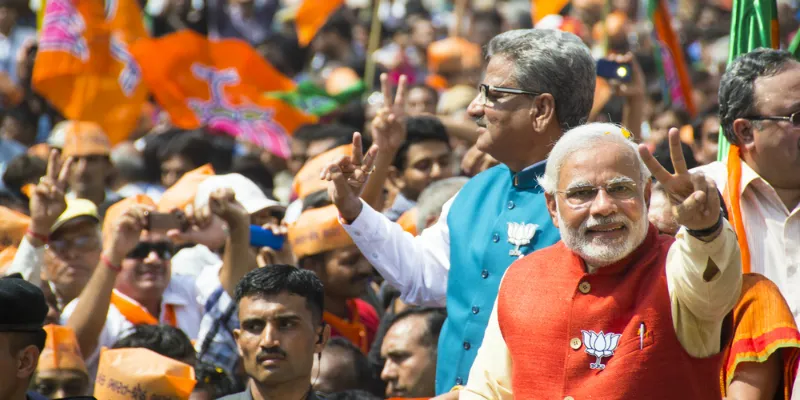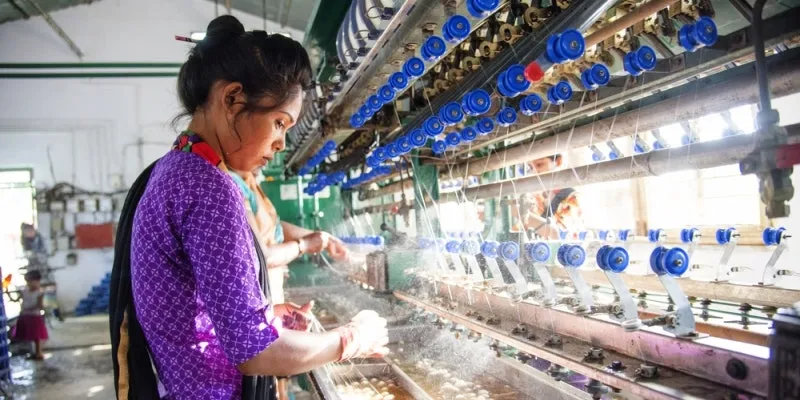The BJP has a clear majority, again: what this means for the social sector in India
From farmers pension schemes to digital libraries and immunisation programmes – here’s what the BJP’s win means for the social sector.
So, the hectic campaigning is done, as is the seven-phase election that had over 60 million people cast their vote to send 542 law makers to the Lok Sabha.
Now, it’s time to get down to business. And the order of business, directed and guided by the manifesto of the alliances, has steep targets.

BJP wins big in the 2019 elections.
Here are the schemes and initiatives promised by the Bharatiya Janata Party (BJP)-led National Democratic Alliance (NDA) for the social sector.
Also read: BJP's journey from just two seats in Lok Sabha in 1984 to winning two back-to-back majority
Agriculture and allied activities
Around 44 percent of the Indian workforce is engaged in agriculture and allied activities. Hence, it is not surprising that political parties committed their highest priority towards farmers’ welfare, and agricultural productivity.
One of the key initiatives launched by the BJP government was the Pradhan Mantri Kisan Samman Nidhi Yojana, which guaranteed minimum income for farmers. Under this scheme, farmers who own up to two acres of land were promised financial support. Over the next five years, the government plans to expand the coverage of this scheme to all farmers.
The government is also looking to introduce a pension scheme for all small and marginal farmers after they turn 60 years.
1558629589451.png?fm=png&auto=format)
The government has committed to infuse an investment of Rs 25 lakh crore into the agriculture sector.
With a view to boost crop yields, the NDA has committed to infuse an investment of Rs 25 lakh crore into the sector. Besides, they have also extended the Kisan Credit Card Loan Scheme to provide short-term interest-free loans of up to Rs 1 lakh for a period of one to five years on the condition of prompt repayment of the principal amount. Previously, this scheme was limited to sanctioning credit after charging a reasonable rate of interest.
Another initiative in the offing is the creation of efficient storage and transport mechanisms for agricultural produce. As part of the Pradhan Mantri Krishi Sampada Yojana, the NDA promised to expand warehousing facilities along the national highways to ensure logistical linkages.
In addition, the NDA promised to create 10,000 new Farmer Producer Organisations (FPOs) by 2022 to aid farmers to achieve economies of scale and enhance their access to input materials and markets.
Also read: Modi's big win signals strong GDP growth will continue in India
Health
Accessibility and affordability of healthcare in India has been poor, and to combat this, the BJP launched the Ayushman Bharat scheme in September 2018. As part of this initiative, the government started a programme to set up 1.5 lakh Health and Wellness Centres (HWCs) by 2022.
1558629714419.png?fm=png&auto=format)
The BJP government will be expediting the programme of setting up 1.5 lakh Health and Wellness Centres across India.
The government has established 17,150 HWCs so far, so attaining the target would be key. The NDA manifesto states it would outline a system to provide for telemedicine and diagnostic laboratory facilities at these HWCs.
The doctor-patient ratio in India as of 2018 was an abysmal 1:1000 according to a report published by the National Center for Biotechnology Information (NCBI). To address this, the NDA has said it would improve the situation by increasing the number of MBBS seats by 18,000 and post-graduate medical seats by 12,000. The new government should look at doubling the number of doctors by 2024.
The BJP government will also continue its immunisation programme - Mission Indradhanush – which has so far immunised 3.39 crore children and 87.18 lakh pregnant women.
Education
In its first term, the BJP government initiated a range of programmes in the education space - Samagra Shiksha, Saakshar Bharat and Jan Shikshan Sanstha. The government also focused its efforts on training teachers under the ‘National Institutes of Teachers’ training’ programme to provide four-year integrated courses for teachers.
1558629825691.png?fm=png&auto=format)
Promoting quality learning will be the key focus for the government this term.
The BJP government, according to the manifesto, will look at introducing technology to students early on in the form of smart classes. In its previous term, it had launched the ‘National Digital Library of India’ to provide access to e-books to students free of cost. This term, the government might extend this programme.
Besides, the government will also focus on promoting excellence and quality learning in higher educational institutions while retaining their functional autonomy.
Also read: Elections 2019: First time voters have great expectations, say need clean and fair governance
Women Empowerment
The BJP government had launched a slew of programmes for women like Ujjwala, Pradhan Mantri Awas Yojana, Saubhagya in its previous term. In its next term, it plans to formulate a comprehensive ‘Women in Workforce’ roadmap. Besides, the government is planning to source 10 percent of its procurement from small and medium enterprises (SMEs) where at least 50 percent of the workforce is women.

A comprehensive ‘Women in Workforce’ roadmap is in the offing in the coming days.
While it is already mandatory for any establishment with 50 or more employees to have a creche facility, the government will now look to strengthen the creche programme with special focus on the needs of parents employed in the unorganised sector, leveraging existing Anganwadis, civil society organisations and the private sector.
Skill Development and Inclusion
India comes up short when it comes to a skilled workforce. The Skill India campaign was initiated in 2015 to increase the number of skilled workers in the country. The objective of the programme was to train 40 crore people in various skills by 2022 under schemes such as National Skill Development Mission, National Policy for Skill Development and Entrepreneurship, and Pradhan Mantri Kaushal Vikas Yojana (PMKVY). Now, the government wants to formulate a ‘National Policy for Re-skilling and Up-skilling’.
The government has also promised to create a scheme for the skill development and welfare of local artisans. The initiative will focus on proving artisans with access to credit, working capital, and social security.
1558630338380.png?fm=png&auto=format)
The government will be putting in more efforts to make public places accessible in the country.
Over 21 million people in India suffer from some kind of disability, and the Sugamya Bharat or Accessible India Campaign was launched in 2015 to cater to the needs of the disabled by making public places accessible, sensitising the mainstream society about various disabilities, and launching an online library for the community. The government is set to continue these efforts, and will also strengthen anganwadis and pre-schools to ensure cases of disabilities are detected at an early stage.






